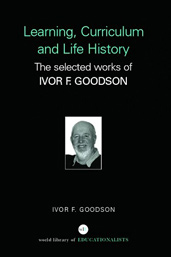Learning, Curriculum and Life Politics: the selected works of Ivor F. Goodson
Towards a Social Constructionist Perspective
The reasons for the reaction to theory are then clear but it was, one must remember, a reaction to a particular kind of prescriptive theory suiting the ideological and economic context in which it was produced. The pendulum swing produced a full scale flight to the arena of action, of practice, the classroom, the practitioner, the practical. We stand witness to a celebration of the practical, a revolt against the abstract. We are back with Rousseau and Emile but with the same problems if progress is ever to be pursued.
The problem of the hasty embrace of action and practice was compounded by the kind of action embraced. To the problems of the methodology of action and practical specificity must be added the problem of focus. Not surprisingly those with a strong belief in practice and action sought ways of becoming involved. Curriculum projects offered a way into curriculum action: the ethos of CARE developed from the involvement of the key personnel in the preceding Humanities Curriculum Project. The particular view of professionalism and politics developed on HEP was later transferred over to become a total position about curriculum research in general.
In the 1960s and the early part of the 1970s a wide range of curriculum research studies and papers discussed the issue of curriculum change. It was always dealt with as synonymous with innovation. Eric Hoyle's How Does the Curriculum Change: A Proposal for Inquiries is a good example (Hoyle 1969). In addition innovation and curriculum projects were viewed as synonymous. To confirm the point it is worth re-reading Parlett and Hamilton's important paper on Evaluation as Illumination. The specificity of focus for those seeking to change the school curriculum is clear. The illuminative evaluator was characteristically concerned with 'what is happening'. They wanted therefore to
study the innovatory project: how it operates, how it is influenced by the various school situations in which it is applied; what those directly concerned regard as its advantages and disadvantages and how students' intellectual tasks and academic experiences are more affected.
The illuminative evaluator then
aims to discover and document what it is like to be participating in the scheme, whether as a teacher of pupil; and in addition, to discern and discuss the innovation's most significant features, recurring concomitants and critical processes (Parlett and Hamilton 1972).
